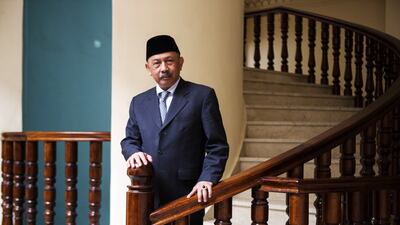ABU DHABI // Indonesia plans to maintain a ban on its citizens working as household staff for the foreseeable future, despite the planned introduction of laws to guarantee them greater rights.
The Indonesian ambassador to the UAE acknowledged that a draft law passed by the Federal National Council last month would clearly set out working hours, days off and paid holidays for domestic staff including maids, nannies, gardeners and drivers.
But Husin Bagis said Jakarta’s focus would be to develop skilled workers rather than send unskilled labour to the Gulf states.
"We want to promote our skilled workforce who want to travel overseas for employment," Mr Bagis said. "At the same time, we discourage our women travelling overseas for housemaid jobs."
He said he remained concerned about the way some families treated domestic workers.
Mr Bagis said housemaids had been overworked, had wages withheld and been physically and sexually assaulted.
More than 100,000 Indonesians live in the UAE, with between 60 and 70 per cent of them domestic workers.
A ban on Indonesian housemaids working in the region has been in place since early 2015 after reports of exploitation.
Indonesian officials will not attest job offers or documents, but many of their citizens enter Middle East states on visit visas then secure jobs.
Many are also brought into the country by unscrupulous agents on false promises, Mr Bagis said.
"They bring them on a tourist visa or a cleaner’s visa. Once they are here, they are forced to work as housemaids," the diplomat said.
Monthly salaries can be as little as Dh1,200 or even lower.
Mr Bagis said Indonesian missions spent large amounts of money on the welfare of housemaids who fled from their sponsors.
"It’s a huge task to follow up with government departments, chase employers, recruitment agencies, follow court cases and eventually repatriate citizens," he said.
The embassy has allocated additional staff to work with abused workers and others caught up in labour disputes.
"We send embassy staff to different government entities and sponsors involved with any cases and help to resolve matters amicably, then repatriate that person," Mr Bagis said.
At one stage last year, the embassy was sheltering 150 domestic workers, many of whom had fled their employers. Some had their passports withheld, others their salaries.
The draft law passed last month is intended to prevent such situations by clearly setting out employees’ rights to sponsors.
The bill stipulated one day off a week, 30 days’ paid holidays and at least 12 hours of rest a day. Passports and identity cards cannot be withheld.
The draft law awaits approval by the President, Sheikh Khalifa.
But Mr Bagis said there would be no change to the Indonesian policy.
"Better training has become a part of the curriculum as all schools, and colleges and universities do their part and encourage instilling technical skills among youngsters."
He urged any Indonesians considering moving to the Gulf to do so through the proper legal channels.
anwar@thenational.ae

